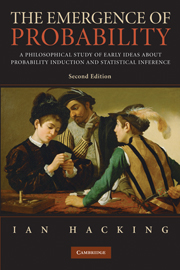 The Emergence of Probability
The Emergence of Probability Book contents
- Frontmatter
- Contents
- Introduction 2006
- 1 An absent family of ideas
- 2 Duality
- 3 Opinion
- 4 Evidence
- 5 Signs
- 6 The first calculations
- 7 The Roannez circle (1654)
- 8 The great decision (1658?)
- 9 The art of thinking (1662)
- 10 Probability and the law (1665)
- 11 Expectation (1657)
- 12 Political arithmetic (1662)
- 13 Annuities (1671)
- 14 Equipossibility (1678)
- 15 Inductive logic
- 16 The art of conjecturing (1692[?] published 1713)
- 17 The first limit theorem
- 18 Design
- 19 Induction (1737)
- Bibliography
- Index
6 - The first calculations
Published online by Cambridge University Press: 05 April 2013
- Frontmatter
- Contents
- Introduction 2006
- 1 An absent family of ideas
- 2 Duality
- 3 Opinion
- 4 Evidence
- 5 Signs
- 6 The first calculations
- 7 The Roannez circle (1654)
- 8 The great decision (1658?)
- 9 The art of thinking (1662)
- 10 Probability and the law (1665)
- 11 Expectation (1657)
- 12 Political arithmetic (1662)
- 13 Annuities (1671)
- 14 Equipossibility (1678)
- 15 Inductive logic
- 16 The art of conjecturing (1692[?] published 1713)
- 17 The first limit theorem
- 18 Design
- 19 Induction (1737)
- Bibliography
- Index
Summary
The first faltering steps towards a European arithmetic of games of chance have been well chronicled by Øystein Ore [1953, 1960] and others. The only sixteenth-century book on the subject was not published until 1663, but throughout the sixteenth century various exercises on random phenomena occur in the commercial tracts that we now recognize as the start of European algebra. There are two fairly distinct aspects of these anticipations of probability theory: combinatorial problems, and problems about repeated gaming. The latter concern the division of spoils in an incompleted game. They form part of a large corpus of ‘division problems’ that arise in trade, and most of which have no aleatory basis. No one was able to solve those that were related to chance. It would be a brave interpreter of these early exercises who could assert, with confidence, that the authors had any idea that they were dealing with a new kind of subject matter. They were attacking one of a host of problems of ‘fairness’ that beset the new merchant class, and probability, in general, had nothing to do with these.
Combinatorial problems have a different kind of history. They become hooked up with the division problem in a clear and recognizable way only in the time of Pascal. Roughly speaking, combinatorial problems remain thoroughly in league with the alchemical magic of signs until the sign itself is liberated from that background in the seventeenth century. The great alchemist Raymond Lulie (1234-1315) is usually cited as the founder of the theory of combinations.
- Type
- Chapter
- Information
- The Emergence of ProbabilityA Philosophical Study of Early Ideas about Probability, Induction and Statistical Inference, pp. 49 - 56Publisher: Cambridge University PressPrint publication year: 2006
